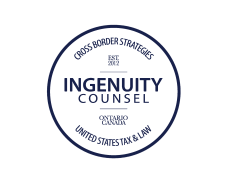The Internal Revenue Service recently announced 2024 annual inflation adjustments for more than 60 tax provisions in Revenue Procedure 2023-34.
If you are a U.S. citizen, a Green Card holder, or a Canadian snowbird who owns U.S. property or other assets situated in the U.S., including shares in U.S. corporations, you should know about the new U.S. estate tax exemption for 2024.
Estates of decedents who die during 2024 have a basic exclusion amount of US$13,610,000, increased from US$12,920,000 for estates of decedents who died in 2023. The maximum estate tax rate of 40% for estate taxable assets exceeding US$1,000,000 still applies for the 2024 tax year.
You should know that without U.S. legislative action, the federal estate tax basic exclusion amount will be reduced to approximately US$7,000,000 per decedent estate in 2026 pending final inflation adjustments due to a “sunset” provision in the Tax Cuts and Jobs Act that was passed in December 2017 under the Trump Administration.
For typical snowbirds—Canadian persons who are not U.S. residents for income, gift, or estate tax purposes—a married couple who personally own U.S. real property but does not have a joint worldwide estate of greater than US$27,220,000 (twice the US$13,610,000 exclusion amount) for 2024, no U.S. estate tax exposure would exist at the death of the first spouse. There’s a but though.
Although no estate tax may exist after applying the basic exclusion amount and additional marital credit available under the Canada-U.S. Tax Treaty, if the value of the U.S. real property or other assets situated in the U.S., including shares in U.S. corporations, exceeds US$60,000, a U.S. non-resident estate tax return (IRS Form 706NA) must be filed. The processing of IRS Form 706NA and the request for a Transfer Certificate takes 15 – 18 months (>24 months, if the estate is taxable and you require an Estate Tax Closing Letter). Regardless that most Canadians who might have a U.S. estate tax filing requirement will eventually owe no estate tax, the asset(s) that create the filing requirement will be frozen until the IRS provides the Transfer Certificate. This can create a significant administrative and practical burden for the estate and the beneficiaries. That means, the estate or the beneficiaries would not be able to sell the real property or access any financial accounts.
Depending on the ultimate worldwide estate of the surviving spouse, though, additional planning to reduce or eliminate U.S. estate tax for the surviving spouse at death should be considered. We encourage you to discuss this with your cross-border estate advisor.
The lifetime gift tax exclusion continues to be linked with the U.S. estate tax exemption. So, for 2024, that will be US$13,610,000. In 2024, annual gifts exceeding the annual exclusion of US$18,000 to anyone other than someone’s non-U.S. citizen spouse (US$185,000) will require filing a U.S. Gift Tax Return (IRS Form 709). The amount of the taxable gift will reduce the lifetime gift tax exclusion.
The annual gift exclusion has been increased from US$17,000 to US$18,000 for 2024. An annual gift from a U.S. citizen to their non-citizen spouse increased from US$175,000 to US$185,000 for 2024.
However, there is no relief for gift tax in the Canada-U.S. Tax Treaty, which means any gift of U.S property in excess of the annual gift exclusions, would trigger a gift tax return filing requirement and actual tax liability.
If you want to discuss U.S. estate tax planning or U.S. probate and estate administration, please contact our office at 519-252-3888 or mk@ingenuitycounsel.com.
